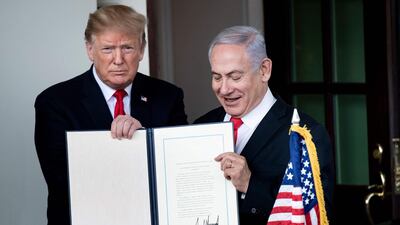Israeli Prime Minister Benjamin Netanyahu on Saturday said he expected US President Donald Trump's peace plan for the Middle East to be "historic" ahead of a trip to Washington.
Mr Trump announced on Thursday that he will release his long-delayed plan before meeting Mr Netanyahu in Washington.
"An opportunity such as this comes once in history and cannot be missed... I am full of hope that we are on the verge of a historic moment in the annals of our state," said Mr Netanyahu.
He has been invited to meet Mr Trump at the White House on Tuesday to discuss the plan.
"It's a great plan. It's a plan that really would work," Mr Trump said.
Mr Netanyahu's political rival Benny Gantz has also received an invitation to attend the White House talks.
Mr Gantz told a news conference in Tel Aviv on Saturday that the "peace plan devised by President Trump will go down in history as a meaningful landmark".
He expected the initiative to allow "different players in the Middle East to finally move ahead towards an historic regional agreement".
The Palestinian leadership was not invited and has already rejected Mr Trump's plan amid tense relations with the US president over his recognition of Jerusalem as Israel's undivided capital.
"This step only reaffirms our absolute rejection of what the US administration has done so far, particularly the recognition of Jerusalem as Israel's capital," Palestinian President Mahmud Abbas' spokesman said in a statement earlier this week.
The Palestinians see east Jerusalem as the capital of their future state and believe that Mr Trump's plan buries the two-state solution that has been for decades the cornerstone of international Middle East diplomacy.
World powers have long agreed that Jerusalem's fate should be settled through negotiations between Israel and the Palestinians.
Israel has occupied east Jerusalem and the West Bank since the 1967 Six-Day War.
More than 600,000 Israelis now live there in settlements considered illegal under international law.
Mr Trump's peace plan has been in the works since 2017.
An economic part of the initiative was unveiled in June and calls for $50 billion in international investment in the Palestinian territories and neighbouring Arab countries over 10 years.
Mr Trump came to power in 2017 promising to broker Israeli-Palestinian peace, which he labelled the "ultimate deal".
The US president has repeatedly boasted that he is the most pro-Israeli US president in history.
Mr Netanyahu on Saturday again called him "the greatest friend that Israel has ever had".
"For three years, I have spoken with President Trump and his staff about our most vital national and security needs, which must be included in any diplomatic arrangement. I have found an attentive ear in the White House to these needs," Mr Netanyahu said in his statement.
Mr Gantz also showered Trump with praise during his news conference.
"The United States is Israel's closest ally and friend and under President Trump's leadership, the alliance between Israel and the United States has grown stronger, deeper and more significant than ever," he said.
"I wish to thank President Trump for his dedication and determination in defending the security interests that both Israel and the US share," he said, adding that he will meet the US president on Monday.
Mr Trump's meeting with Mr Netanyahu and Mr Gantz comes a little more than a month before new Israeli elections, with polls showing Mr Netanyahu's right-wing Likud and Mr Gantz's centrist Blue and White party neck-and-neck.


